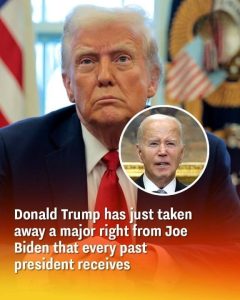
Trump Blocks Biden from Intelligence Briefings, Citing Security Concerns
In a move that has sparked significant debate, former President Donald Trump has decided to revoke Joe Biden’s access to intelligence briefings, a privilege traditionally extended to former presidents. Trump justified this action by asserting that Biden cannot be trusted with sensitive national security information, a claim that has divided political and security experts.
A Break from Tradition Historically, former presidents have continued to receive intelligence briefings as a courtesy, allowing them to stay informed on national security matters. This practice acknowledges their experience and potential advisory role in global affairs. However, Trump has taken a different stance, stating that Biden’s handling of classified information raises concerns about his reliability in dealing with sensitive intelligence.
Trump’s Justification Trump announced the decision through posts on his Truth Social platform, citing concerns over Biden’s cognitive abilities and past handling of classified documents. He also pointed to Biden’s previous move in 2021 to revoke Trump’s own intelligence briefings, suggesting that Biden had set a precedent for such actions.
Trump declared, “There is no reason for Joe Biden to have access to classified information,” emphasizing that national security must come before tradition. The move is seen as part of Trump’s broader effort to contrast his leadership style with Biden’s as they prepare for the 2024 election.
Political and Security Implications The decision has ignited discussions among political analysts and security experts. Supporters argue that national security should take precedence over historical norms, especially if there are concerns about the individual’s ability to manage sensitive information. Critics, however, see it as a politically motivated act that undermines the unwritten rules of presidential transitions.
Legal experts are also weighing in on whether a former president has the authority to deny another former leader access to intelligence briefings. While the executive branch ultimately controls intelligence access, some question the long-term consequences of personal rivalries influencing security decisions.
Reactions from Both Sides Reactions have been sharply divided. Trump’s allies applaud the move, framing it as a necessary step to protect national security. Many argue that Biden’s handling of classified materials warrants a reassessment of his access to sensitive information.
On the other hand, Biden’s supporters criticize the move as an attempt to politicize national security. Some former intelligence officials warn that turning intelligence access into a political tool could erode trust in the system and set a precedent for future administrations to use security clearances as leverage against opponents.
International Perspective Beyond the U.S., the move is being closely observed by global leaders. Intelligence-sharing among allies relies on stability and continuity, and any indication that access to sensitive data is subject to political shifts could impact diplomatic relationships. Foreign governments may reassess their intelligence-sharing agreements with the U.S. if they perceive security briefings as politically influenced.
Setting a Precedent Trump’s decision raises broader questions about the role of former presidents in national security. The tradition of granting intelligence briefings has long been rooted in the belief that former leaders can offer valuable insight and assistance in times of crisis. By breaking with this norm, Trump may have set a new precedent where intelligence access is determined not by tradition but by political considerations.
What Comes Next Biden has downplayed the decision, suggesting that the change does not significantly impact his ability to remain informed on critical issues. However, analysts believe this could signal a shift in how intelligence access is handled for former presidents in the future.
As discussions continue, the controversy underscores the ongoing tension between politics and national security. Whether viewed as a necessary measure or a political maneuver, Trump’s decision has reshaped the conversation around intelligence briefings and presidential privileges, with implications that may extend beyond the current administration.